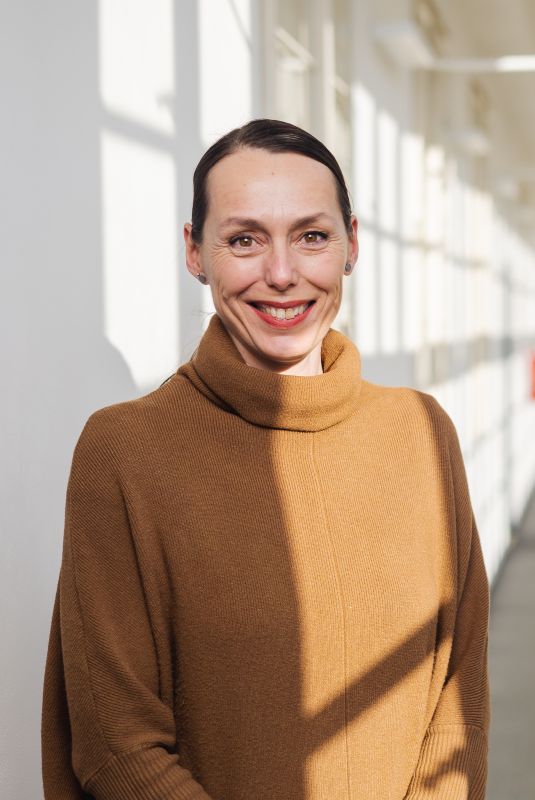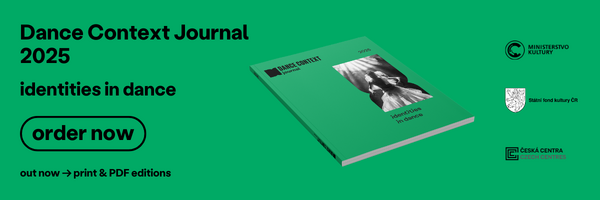Few Questions for Markéta Perroud, Co-director of TANEC PRAHA Festival
What exactly do you do as a co-director of TANEC PRAHA festival and what does your cooperation with Yvona Kreuzmannová (TANEC PRAHA festival director and founder and chair of the organizing civic association Tanec Praha) look like?
Our cooperation is based on representation of TANEC PRAHA both home and abroad, participation in the creation of the festival programme and of course dealing with the production issues. Cooperation with Yvona is based on mutual respect – respect from my side that Tanec Praha is her product and thanks to her the festival has earned over the past 25 years its current status. On the other hand, I try to provide her with some different impulses, to make the festival more varied in a way and suggest new posibilities. It is sort of a dialogue between us and the cooperation works fine so far. This year it is actually the first year that Yvona is back as the director during the maternity leave of Alena Brožová (former director of TANEC PRAHA, ed. auth.). So we will see how the cooperation develops in the future.

Markéta Perround. Photo: Adam Mráček.
You worked in France for a long time. What was the impulse that brought you back to the Czech Republic?
I lived in France for nearly fifteen years, although originally I went there only for one year. For most of the time I was a member of the Lyon Opera Ballet, a contemporary dance ensemble. Anyway, after twelve years in this company, where I had the opportunity to work with the greatest makers of contemporary dance, I felt it was the right time to leave. Repertoire-oriented company is large and you gradually mature and eventually want to go your own way... Yvona Kreuzmannová was frequenting the Lyon Biennale de la Danse, where we often met each other, because she had known me from the time I worked in Prague with the Prague Chamber Ballet. One day she came and asked me if I wanted to go back to Prague and collaborate on the TANEC PRAHA festival. At first I refused, because I was more into teaching back then, but after some time I changed my mind, discussed the thing with my husband and we decided to give it a try. Since I had left the Czech Republic several years earlier, it was logical for me to bring back the know-how that I had accumulated. Of course, another question is to what extent I can interpret and make good use of it.
How do you compare the Czech dance scene with the French one? What was (or maybe still is) difficult for you to get used to when you came back?
Almost everything is different. In particular, in France you can feel the support from above, from the politicians. If someone in France decides to support something and spend money on it, he or she is interested in it as well and keeps an eye on how the project develops. There are certain rules. Here in the Czech Republic when you ask politicians for some support, it really does not look like there is anyone interested in our activities at all. And I am really shocked by such a lack of interest. This year we work on site-specific projects with renowned entities such as re-SITE festival. I never thought that even they would have similar problems with obtaining some signature, which decides the next course of action of a project several dozens of people are involved in... Even though events like that are the best promotion for any city. Working conditions for dancers are different, too. In France, there is a very sophisticated structure both the promoter and performer can rely on. On the other hand, it is also one of the things that made me leave France. The local support creates some sort of comfort that often clashes with the spontaneous creation. There is no such problem in the Czech Republic, on the contrary, people are really creative here. Due to the fact that here one really has to struggle so that something can be created at all, there is an incredible energy. A Czech person could always cope with anything he or she came across and it is no different with artists. However, the question is how far they can get with their work in the local circumstances.
Could you tell us your favourite artist on the programme of the 25th year of TANEC PRAHA? Something or someone you definitely would not miss?
It is very difficult to say. In Prague, I see every performance, I also try to be involved in accompanying programme events as much as possible. Unfortunately, I have no time then to take part in the events outside Prague. But generally I think every performance will find its admirers. Of course, at the moment I am looking forward to the end of the festival, the gala-closing evening of which will feature a star in the world of contemporary dance – British dancer and choreographer Akram Khan. He performs on July 3rd and July 4th at the State Opera. The solo DESH is performed by Akram himself and it is the very first time the Czech audiences get to see him in person. We are very pleased that we have managed to bring such a popular and demanding production to Prague. I believe it will be a memorable ending of this jubilee year of the festival.
Markéta Perroud (née Plzáková)
After finishing her studies at the Prague Dance Conservatory in 1990, she worked for 7 years as a soloist with the Prague Chamber Ballet of Pavel Šmok and collaborated on many independent art projects in the Czech Republic and abroad. She became a laureate of the Thalia Award for extraordinary theatrical dance performance of the year 1995. In 1997 she was engaged as a soloist in Ballet de l'Opéra National de Lyon, where she worked until 2010. She worked with leading choreographers such as Mats Ek, Jiří Kylián, Ohad Naharin, Trisha Brown, Maguy Marin, Nacho Duato, Tero Saarinen, Russell Maliphant and others. She holds a French state diploma in Dance Education (since 2004). In 2009-2010 she completed a one-year curriculum of cultural management in Lyon. Since 2010 she has collaborated with Tanec Praha o.s. as a member of Arts Council of TANEC PRAHA festival. Since November 2011 she has been the festival co-director. In January 2012 she moved from France back to the Czech Republic.




